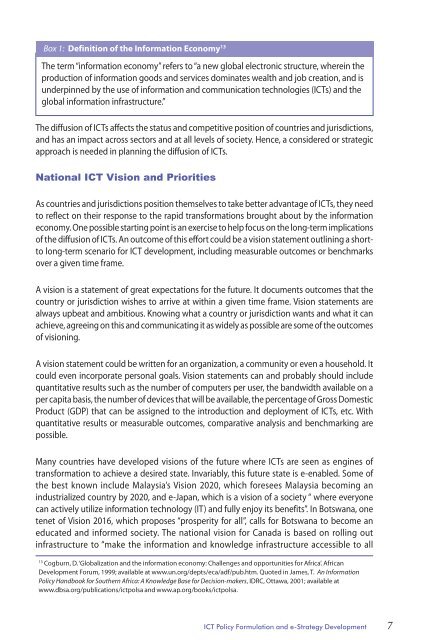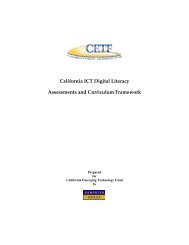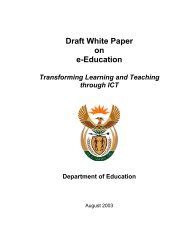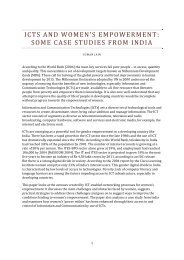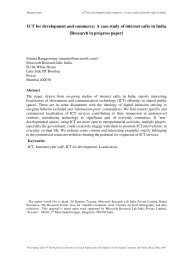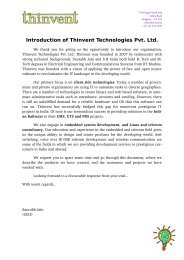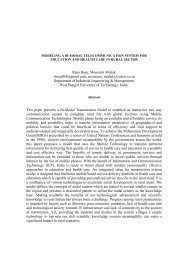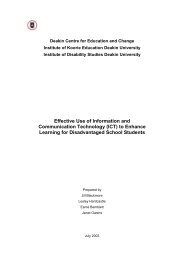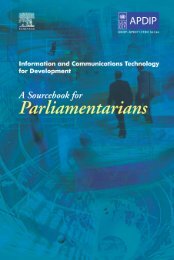ICT Policy Formulation and e-Strategy Development: A ... - un-apcict
ICT Policy Formulation and e-Strategy Development: A ... - un-apcict
ICT Policy Formulation and e-Strategy Development: A ... - un-apcict
You also want an ePaper? Increase the reach of your titles
YUMPU automatically turns print PDFs into web optimized ePapers that Google loves.
Box 1: Definition of the Information Economy 13<br />
The term “information economy” refers to “a new global electronic structure, wherein the<br />
production of information goods <strong>and</strong> services dominates wealth <strong>and</strong> job creation, <strong>and</strong> is<br />
<strong>un</strong>derpinned by the use of information <strong>and</strong> comm<strong>un</strong>ication technologies (<strong>ICT</strong>s) <strong>and</strong> the<br />
global information infrastructure.”<br />
The diffusion of <strong>ICT</strong>s affects the status <strong>and</strong> competitive position of co<strong>un</strong>tries <strong>and</strong> jurisdictions,<br />
<strong>and</strong> has an impact across sectors <strong>and</strong> at all levels of society. Hence, a considered or strategic<br />
approach is needed in planning the diffusion of <strong>ICT</strong>s.<br />
National <strong>ICT</strong> Vision <strong>and</strong> Priorities<br />
As co<strong>un</strong>tries <strong>and</strong> jurisdictions position themselves to take better advantage of <strong>ICT</strong>s, they need<br />
to reflect on their response to the rapid transformations brought about by the information<br />
economy. One possible starting point is an exercise to help focus on the long-term implications<br />
of the diffusion of <strong>ICT</strong>s. An outcome of this effort could be a vision statement outlining a shortto<br />
long-term scenario for <strong>ICT</strong> development, including measurable outcomes or benchmarks<br />
over a given time frame.<br />
A vision is a statement of great expectations for the future. It documents outcomes that the<br />
co<strong>un</strong>try or jurisdiction wishes to arrive at within a given time frame. Vision statements are<br />
always upbeat <strong>and</strong> ambitious. Knowing what a co<strong>un</strong>try or jurisdiction wants <strong>and</strong> what it can<br />
achieve, agreeing on this <strong>and</strong> comm<strong>un</strong>icating it as widely as possible are some of the outcomes<br />
of visioning.<br />
A vision statement could be written for an organization, a comm<strong>un</strong>ity or even a household. It<br />
could even incorporate personal goals. Vision statements can <strong>and</strong> probably should include<br />
quantitative results such as the number of computers per user, the b<strong>and</strong>width available on a<br />
per capita basis, the number of devices that will be available, the percentage of Gross Domestic<br />
Product (GDP) that can be assigned to the introduction <strong>and</strong> deployment of <strong>ICT</strong>s, etc. With<br />
quantitative results or measurable outcomes, comparative analysis <strong>and</strong> benchmarking are<br />
possible.<br />
Many co<strong>un</strong>tries have developed visions of the future where <strong>ICT</strong>s are seen as engines of<br />
transformation to achieve a desired state. Invariably, this future state is e-enabled. Some of<br />
the best known include Malaysia’s Vision 2020, which foresees Malaysia becoming an<br />
industrialized co<strong>un</strong>try by 2020, <strong>and</strong> e-Japan, which is a vision of a society “ where everyone<br />
can actively utilize information technology (IT) <strong>and</strong> fully enjoy its benefits”. In Botswana, one<br />
tenet of Vision 2016, which proposes “prosperity for all”, calls for Botswana to become an<br />
educated <strong>and</strong> informed society. The national vision for Canada is based on rolling out<br />
infrastructure to “make the information <strong>and</strong> knowledge infrastructure accessible to all<br />
13<br />
Cogburn, D. ‘Globalization <strong>and</strong> the information economy: Challenges <strong>and</strong> opport<strong>un</strong>ities for Africa’. African<br />
<strong>Development</strong> Forum, 1999; available at www.<strong>un</strong>.org/depts/eca/adf/pub.htm. Quoted in James, T. An Information<br />
<strong>Policy</strong> H<strong>and</strong>book for Southern Africa: A Knowledge Base for Decision-makers, IDRC, Ottawa, 2001; available at<br />
www.dbsa.org/publications/ictpolsa <strong>and</strong> www.ap.org/books/ictpolsa.<br />
<strong>ICT</strong> <strong>Policy</strong> <strong>Formulation</strong> <strong>and</strong> e-<strong>Strategy</strong> <strong>Development</strong><br />
7


